Public meetings between officials from Russia, Belarus, the People’s Republic of China (PRC), Iran, and North Korea have surged in recent days, with at least 10 high-level bilateral meetings between April 22 and 26, underscoring the deepening multilateral partnership these states are constructing to confront the West. Russian Defense Minister Sergei Shoigu attended the Shanghai Cooperation Organization (SCO) meeting of defense ministers in Astana, Kazakhstan on April 26.[i] Shoigu met with PRC Minister of National Defense Dong Jun on the sidelines of the meeting and highlighted the “unprecedented” level of Russo-Sino relations.[ii] Shoigu also met with Iranian Defense Minister Mohammed Reza Ashtiani and stated that Russia is prepared to expand Russo-Iranian military and military-technical cooperation.[iii] Ashtiani is primarily responsible for managing arms procurement and sales and the Iranian defense industrial base, which makes these meetings particularly noteworthy. Dong and Ashtiani held a bilateral meeting and called for increased Sino-Iranian cooperation, including in the defense and military spheres.[iv] Belarusian Defense Minister Lieutenant General Viktor Khrenin also met with Dong and Ashtiani at the SCO meeting on April 26.[v] The April 26 SCO meeting marked Iran’s first SCO meeting as a member state since joining the organization in July 2023.[vi]
The SCO meetings are only the latest in a series of bilateral meetings between Russia, Belarus, the PRC, Iran, and North Korea. Russian Deputy Foreign Minister and Special Representative to the Russian President for Middle East and African Countries Mikhail Bogdanov met with Iranian Deputy Foreign Minister for Political Affairs Ali Bagheri Kani in Moscow on April 26.[vii] Russian Security Council Secretary Nikolai Patrushev met with PRC Communist Party Politburo member Chen Wenqing on April 23 in St. Petersburg and discussed strengthening cooperation between Russian and PRC intelligence services.[viii] Patrushev also met with Iranian Supreme National Security Council Secretary Ali Akbar Ahmadian in St. Petersburg on April 24, and they signed a memorandum of understanding between the two countries’ security councils.[ix] A North Korean delegation led by Minister for External Economic Relations Yun Jong Ho travelled to Iran on April 23.[x] Head of the Belarusian Ministry of Defense’s (MoD) Department of International Military Cooperation Major General Valery Revenko met with Iranian Deputy Minister of Defense and rector of the Malek Ashtar University of Technology Mehdi Jafari on April 22 in Minsk.[xi] Although the details and results of these various bilateral meetings are unclear, the overt increase in their number and frequency is notable and demonstrates the group’s increased eagerness to publicly display its military and political cooperation in its competition and confrontation against the West.
The above text is featured in the Institute for the Study of War’s Russian Offensive Campaign Assessment published on April 26, 2024.
Iranian Deputy Foreign Affairs Minister for Political and Political Affairs and chief nuclear negotiator Ali Bageri Kani met with Russian and Chinese officials in a BRICS meeting in Moscow, Russia on April 25. Bagheri Kani discussed the importance of bilateral ties and regional issues with Russian Deputy Foreign Minister for Middle East and North Africa Affairs Mikhail Bagdanov and PRC Special Envoy for Middle East Affairs Zhai Jun.[xii]
Western reporting has exaggerated how much Hamas has moderated its position toward Israel following an interview with a top Hamas official.[xiii] Western media reported that Khalil al Hayya, the deputy chairman of Hamas’ Political Bureau, said during an interview on April 25 that Hamas is prepared to reach a truce of five or more years with Israel and implied that Hamas would turn into a political party and turn its military wing into “the national [Palestinian] army” if Israel recognizes a fully sovereign Palestinian state in the Gaza Strip and West Bank.[xiv] Western reporting framed Hayya‘s statements to mean that Hamas‘ military wing would “dissolve“ if Israel recognizes a fully sovereign Palestinian state in the Gaza Strip and West Bank.[xv] Hayya did not mention abandoning Hamas’ objective of destroying Israel, nor did he say that the new ”sovereign Palestinian state” would recognize Israel.
Hamas sees control over the Gaza Strip and West Bank as an interim step in the destruction of the Israeli state. Hayya’s interview is entirely consistent with this position. Hamas’ military wing’s website says that the group can ”accept the interim liberation of parts of Palestine” and a ”interim truce” but that these interim steps only ”serve as a warrior’s rest stop.”[xvi] The same page adds that during this interim period, Hamas will not recognize Israel, and Hayya did not indicate that Hamas would do so.[xvii] A five-year truce would serve Hamas’ purposes by allowing the group to prepare for the next round of fighting. Hamas started the current war by breaking a period of relative calm between itself and Israel on October 6, and there is no reason to believe Hamas will honor a future ”truce.”
Iran is attempting to expand Iran’s economic influence in Africa by increasing its economic ties with non-Western partners. Iran likely aims to use these economic ties to circumvent sanctions. Iran held its second annual Iran-Africa Trade Summit in Tehran, Iran, on April 26. Iran’s Ministry of Industry, Mine, and Trade organized the event.[xviii] Iranian media reported that officials from over 30 African Union member states attended the summit.[xix] It is unclear how many African Union member state officials attended the inaugural event in 2023. Iranian President Ebrahim Raisi gave a speech at the summit stressing the need to strengthen trade between Iran and African nations.[xx]
The Raisi administration has long sought to expand Iran’s economic influence in Africa as part of its “neighborhood policy.”[xxi] Raisi focused his July 2023 trips to Kenya, Uganda, and Zimbabwe—then marking the first Iranian presidential visit to Africa in 11 years—on improving economic ties with these countries.[xxii] Increased Iranian economic cooperation with African states will not enable the regime to fix the structural flaws in its economy, however. Greater bilateral trade with foreign countries would enable Iran to increase its capital inflows but will not solve the problems that cause Iran’s economic instability. Fundamental economic reforms—such as reducing the dominance of parastatal organizations in Iran’s economy and combatting corruption and nepotism—would be necessary to meaningfully improve Iran’s economy.[xxiii]
Raisi held separate and private meetings about improving economic ties with Zimbabwean Vice President Constantino Chiwenga and Burkinabe Prime Minister Apollinaire J. Kyélem de Tambèla on the sidelines of the trade summit.[xxiv] The Islamic Revolutionary Guard Corps and regime-affiliated outlets have previously encouraged increased economic engagement with Africa to obtain gold payments that Iran can use to evade sanctions.[xxv] Burkina Faso and Zimbabwe are among the top ten gold producers on the continent, making Raisi’s meetings with officials from these countries particularly noteworthy.[xxvi] Israeli media reported that Zimbabwe signed a uranium deal with Iran in 2013, which Zimbabwe has since denied.[xxvii]
Iran may seek to export arms to some African Union member states like Burkina Faso as part of its effort to improve ties with African states. Iranian officials have repeatedly expressed interest in using arms sales to generate revenue for the economy, particularly following Iran’s success in supplying Russia drones to use in Ukraine.[xxviii] The Burkinabe, Malian, and Nigerien juntas could be amenable to such sales to combat the growing Salafi-jihadi threat in their countries. Weapons sales from Tehran could address their needs while aligning with their anti-Western and aggressively militarized counterinsurgency outlooks.[xxix] Iran has sent Ababil-3 multi-role and Mohajer-6 multi-role drones to Ethiopia, Sudan, and Western Sahara since 2021, setting a potential precedent for future shipments to the Sahel.[xxx] Turkey currently supplies drones to Burkina Faso, Mali, and Niger, however, and Burkina Faso has purchased Turkish drones as recently as April 8.[xxxi]
Iran is facing an increasing threat from Salafi-jihadi groups in southeastern Iran. Iranian security forces conducted a drone strike targeting a vehicle carrying “anti-Iran militants” roughly 60 kilometers southeast of Zahedan in Sistan and Baluchistan Province on April 25. IRGC-affiliated Tasnim News Agency reported that the strike killed two “terrorists” but provided no further details on the identity of the targeted individuals.[xxxii] Iran’s use of drones to target these ”terrorists” is exceptional, and the choice to use drones in this capacity suggests that Iran is facing and increasingly tenuous security environment in southeastern Iran. The strike follows Balochi Salafi-jihadi group Jaish al Adl’s unprecedented attacks in Sistan and Baluchistan Province on April 14. CTP previously noted that the April 14 attacks highlighted the uptick in anti-regime militancy and increasingly precarious state of the Iranian internal security environment.
The US Department of Defense reported on April 26 that the United States began construction on a floating pier off the coast of the central Gaza Strip.[xxxiii] This US-constructed pier will serve as an additional route for humanitarian aid into the Gaza Strip. The US Defense Department told the Wall Street Journal that the World Health Organization (WHO) will inspect the aid in Cyprus and commercial vessels will transfer the aid to the US-constructed floating pier.[xxxiv] US Army vessels will transport the aid from the floating pier to a temporary pier connected to the Gaza Strip by a causeway. Trucks from a ”third country” will transport the aid from the temporary pier to distribution centers run by the United Nations and ”others.”[xxxv] BBC cited unspecified US officials who said that the US-constructed floating pier will be operational in early May.[xxxvi]
US Department of Defense Spokesperson Maj. Gen. Pat Ryder clarified that unidentified Palestinian fighters mortared the marshalling yard where humanitarian aid will be distributed.[xxxvii] CTP-ISW reported on April 25 that unspecified Palestinian fighters mortared construction facilities for the US-built pier in the central Gaza Strip. Israeli media reported that the mortars struck engineering equipment close to the pier.[xxxviii]
Egypt’s General Intelligence chief Abbas Kamel met with Israeli negotiators in Israel on April 26 to revive ceasefire negotiations. Israeli and Western media reported that Egyptian officials were pessimistic that an agreement could be reached. Israeli officials told the Egyptian delegation that Israel would agree to a hostage exchange that releases 33 hostages instead of the proposed 40 hostages under the US-backed ceasefire proposal.[xxxix] Israel would agree to a ceasefire less than six-weeks long in exchange. Israel believes that there are 33 civilian women, children, elderly, and wounded hostages being held in the Gaza Strip. Hamas has refused any hostage exchange agreement that does not include a permanent ceasefire, a full withdrawal of Israeli forces from the Gaza Strip, and the unimpeded return of displaced people to the northern Gaza Strip.[xl] Hamas’ negotiating stance has not changed since December 2023.[xli] The Wall Street Journal reported that the Egyptian delegation is hoping to use these ceasefire talks to “buy time” for the United States and regional states to pressure Israel to pause preparations for an operation into Rafah citing Egyptian officials “familiar with negotiations.”[xlii]
Key Takeaways:
- China, Iran, North Korea, and Russia: Public meetings between officials from Russia, Belarus, the People’s Republic of China (PRC), Iran, and North Korea have surged in recent days, with at least 10 high-level bilateral meetings between April 22 and 26, underscoring the deepening multilateral partnership these states are constructing to confront the West.
- Russian Defense Minister Shoigu also met with Iranian Defense Minister Mohammed Reza Ashtiani and stated that Russia is prepared to expand Russo-Iranian military and military-technical cooperation.[i] Ashtiani is primarily responsible for managing arms procurement and sales as well as the Iranian defense industrial base as defense minister, which makes these meetings particularly noteworthy.
- Hamas: Western reporting has exaggerated how much Hamas has moderated its position toward Israel following an interview with a top Hamas official in which the Hamas official said Hamas would adhere to a five-year truce if Israel recognized a Palestinian state in the Gaza Strip and West Bank. Hamas sees control over the Gaza Strip and West Bank as an interim step in the destruction of the Israeli state and it views any truce with Israel as temporary.
- Iran in Africa: Iran is attempting to expand Iran’s economic influence in Africa by increasing its economic ties with non-Western partners. Iran likely aims to use these economic ties to circumvent sanctions. The IRGC has previously advocated obtaining access to gold in Africa to circumvent sanctions.
- Southeastern Iran: Iran is facing an increasing threat from Salafi-jihadi groups in southeastern Iran. Iran used a drone to strike “terrorists” in southeastern Iran. Iran’s use of drones to target these ”terrorists” is exceptional, and the choice to use drones in this capacity suggests that Iran is facing and increasingly tenuous security environment in southeastern Iran.
- Humanitarian Aid in the Gaza Strip: US Department of Defense Spokesperson Maj. Gen. Pat Ryder clarified that unidentified Palestinian fighters mortared the marshalling yard where humanitarian aid will be distributed.
- Negotiations in the Gaza Strip: Israeli and Western media Egyptian officials are pessimistic that an agreement could be reached between Israel and Hamas to reach a ceasefire in the Gaza Strip. Hamas has not meaningfully changed its negotiating position since December 2023 and refuses to free the hostages it holds without a full Israeli withdrawal from the Strip and a permanent ceasefire.

Gaza Strip
Axis of Resistance objectives:
Erode the will of the Israeli political establishment and public to sustain clearing operations in the Gaza Strip
Reestablish Hamas as the governing authority in the Gaza StripThe al Aqsa Martyrs’ Brigades—the self-proclaimed militant wing of Fatah—and Palestinian Islamic Jihad (PIJ) conducted separate mortar attacks targeting Israeli forces operating in the Netzarim corridor.[xliv] The Netzarim corridor is where Israeli forces have established forward operating bases and outposts to facilitate future raids into the northern Gaza Strip.

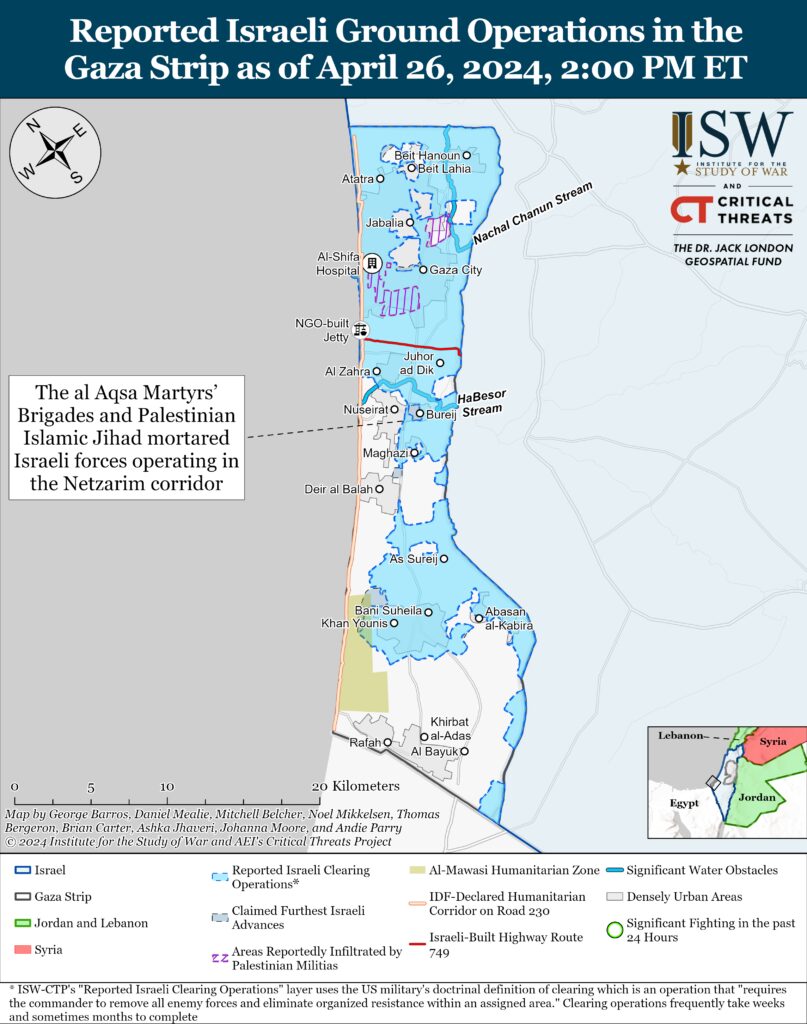
The US State Department paused its earlier decision to restrict military aid to the Netzah Yehuda Battalion under the Leahy Law.[xlv] The Netzah Yehuda Battalion is an ultra-orthodox IDF unit that operates mostly in the West Bank. CBS News reported on April 26 that the State Department is reviewing ”additional information regarding the status of the [Netzah Yehuda Battalion]” from Israel and that there was no official determination on the possible Leahy Law violations.[xlvi] Three US sources with knowledge of the issue told Axios on April 20 that US Secretary of State Antony Blinken was planning to announce that the United States will ban US military assistance and training provided to the Netzah Yehuda Battalion under the 1997 Leahy Law. The Leahy Law makes it illegal for the US government to fund assistance for foreign security forces in which there is credible information that implicates a unit in the gross violation of human rights. Blinken reported that Israel did not effectively investigate the Netzah Yehuda Battalion for the accused violations.[xlvii]
The Palestinian Mujahideen Movement conducted one rocket attack from the Gaza Strip targeting Sderot on April 26.[xlviii] This is the third consecutive day the Palestinian Mujahideen Movement has conduct rocket attacks into southern Israel.[xlix]
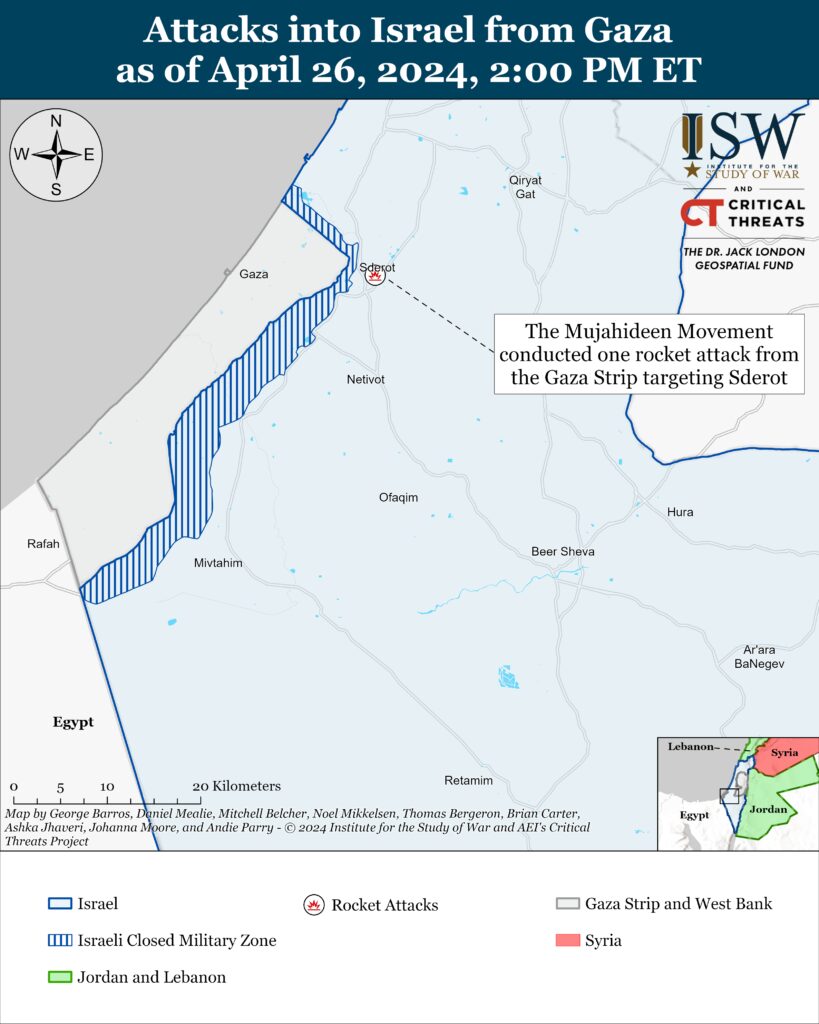
Recorded reports of attacks; CTP-ISW cannot independently verify impact.
West Bank
Axis of Resistance objectives:
Establish the West Bank as a viable front against IsraelIsraeli forces have engaged Palestinian fighters in at least three locations across the West Bank since CTP-ISW’s last information cutoff on April 25.[l] The al Aqsa Martyrs’ Brigades fired small arms and detonated IEDs targeting Israeli forces during Israeli operations in the Balata refugee camp in Nablus.[li]
The IDF detained five individuals across the West Bank on April 26.[lii] The IDF also separately detained two individuals suspected of planning an attack on a farm in the central West Bank.[liii] The IDF confiscated an axe and knives from the suspects.[liv]
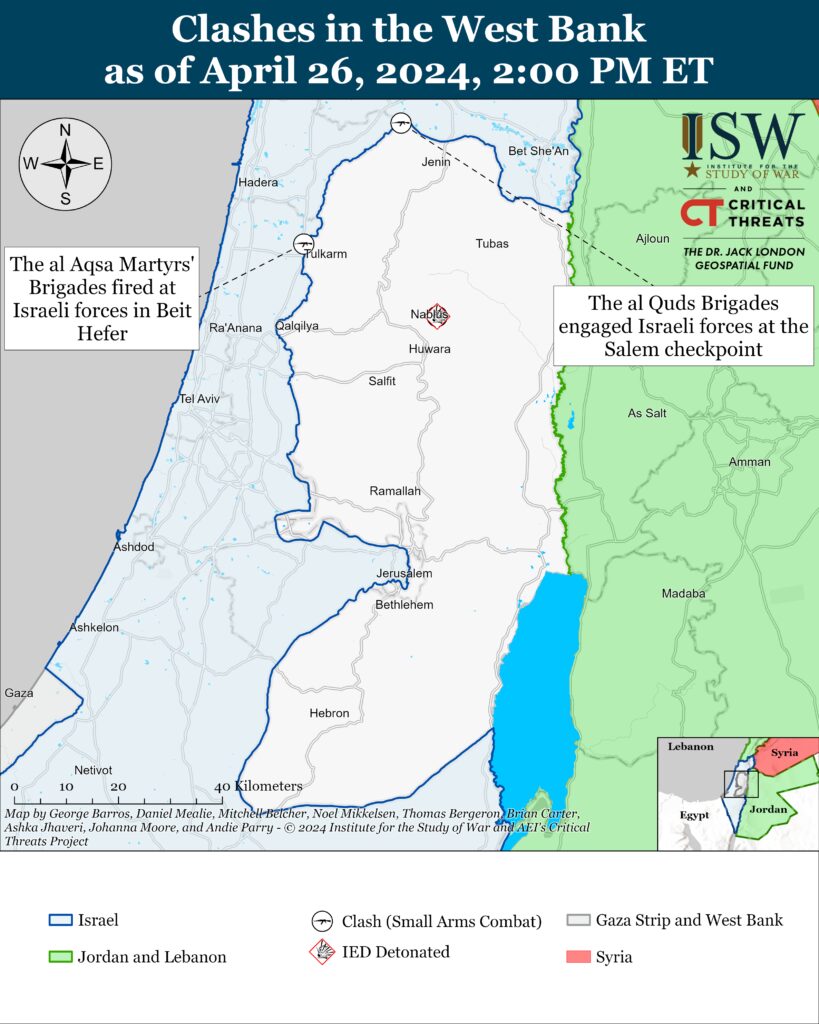
This map is not an exhaustive depiction of clashes and demonstrations in the West Bank.
Southern Lebanon and Golan Heights
Axis of Resistance objectives:
Deter Israel from conducting a ground operation into Lebanon
Prepare for an expanded and protracted conflict with Israel in the near term
Expel the United States from SyriaLebanese Hezbollah has conducted at least three attacks from southern Lebanon into northern Israel since CTP-ISW’s last data cutoff on April 25.[lv]
Hezbollah said that it fired anti-tank guided missiles, rockets, and mortars targeting Israeli vehicles in Ruwaisat al Alam in Shebaa Farms on April 25.[lvi] The IDF reported that the attack killed an Israeli civilian.[lvii] This attack is one of the three attacks noted above.
The IDF conducted an airstrike on April 26 targeting a senior Jamaa al Islamiya member in the Western Bekaa district, roughly nine miles north of Shebaa farms.[lviii] The IDF airstrike occurred 19 hours after the Hezbollah attack targeting Shebaa Farms on April 25. The IDF said that the Jamaa al Islamiya commander was responsible for several attacks targeting Shebaa Farms and that he “cooperated” with Hamas in Lebanon.[lix] Jamaa al Islamiya was founded in 1964 as the Lebanese branch of the Muslim Brotherhood.[lx]
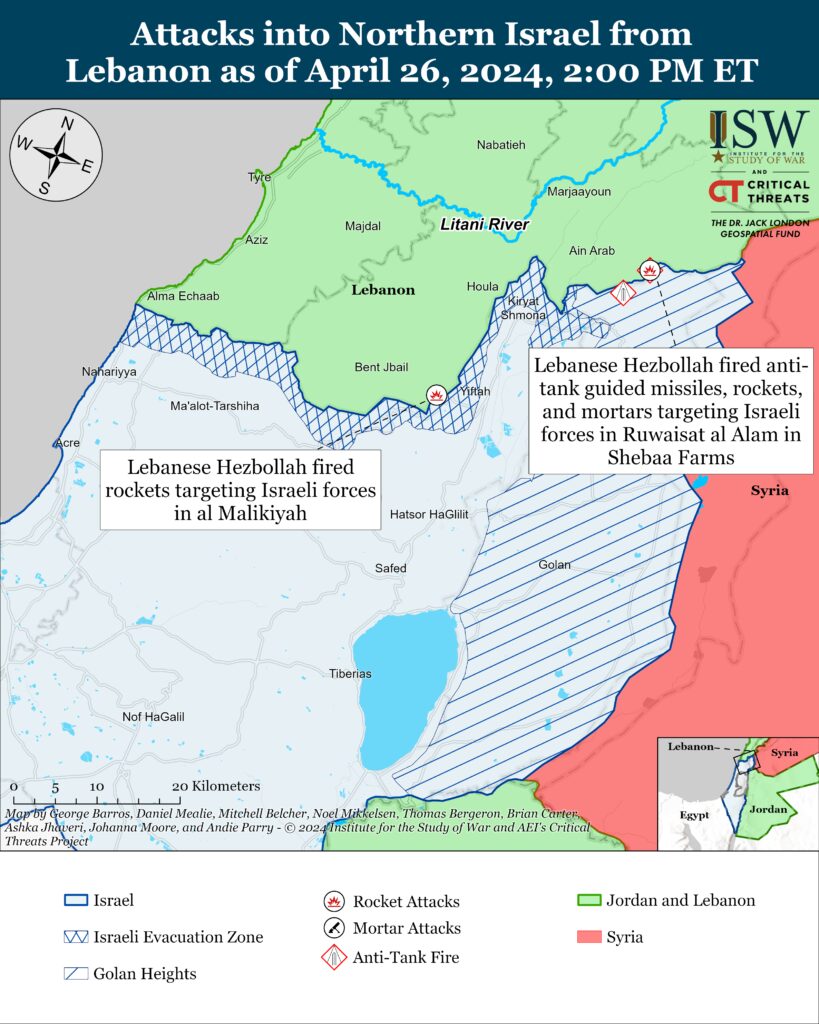
Recorded reports of attacks; CTP-ISW cannot independently verify impact.
Iran and Axis of Resistance
Unspecified actors launched a one-way attack drone that killed four Yemeni nationals at the UAE-operated Khor Mor Gas field in Sulaymaniyah Governorate, Iraq, on April 26.[lxi] The Kurdistan Regional Government Prime Minister Masrour Barzani condemned the attack and stated that the drone “came from a nearby region within Iraq.”[lxii] Barzani is probably referring to federal Iraq, which describes the areas outside the Kurdistan Region. Unspecified actors conducted drone and rocket attacks that briefly suspended gas production at Khor Mor in January 2024.[lxiii]
The Houthis claimed that they attacked a Liberian-flagged merchant vessel MSC Darwin in the Gulf of Aden and separately launched ballistic missiles and drones targeting unspecified targets in Eilat, Israel, on April 25.[lxiv] US CENTCOM reported that the Houthis launched one anti-ship ballistic missile into the Gulf of Aden but added that it did not damage any ships or cause any injuries.[lxv] CENTCOM forces destroyed one Houthi unmanned surface vessel and one Houthi unmanned aerial vehicle in Houthi-controlled areas of Yemen on April 25.[lxvi] CTP-ISW did not observe any media reporting that corroborated the Houthi’s claimed ballistic missile and drone attacks targeting Eilat.
The United Kingdom Maritime Trade Operations (UKMTO) reported that an unspecified explosion and added that two missiles damaged a commercial vessel 14 nautical miles from al Mokha, Yemen, on April 26.[lxvii] A Yemeni journalist reported that the Houthis launched a ballistic missile from near Taiz around the same time as the UKMTO report.[lxviii]
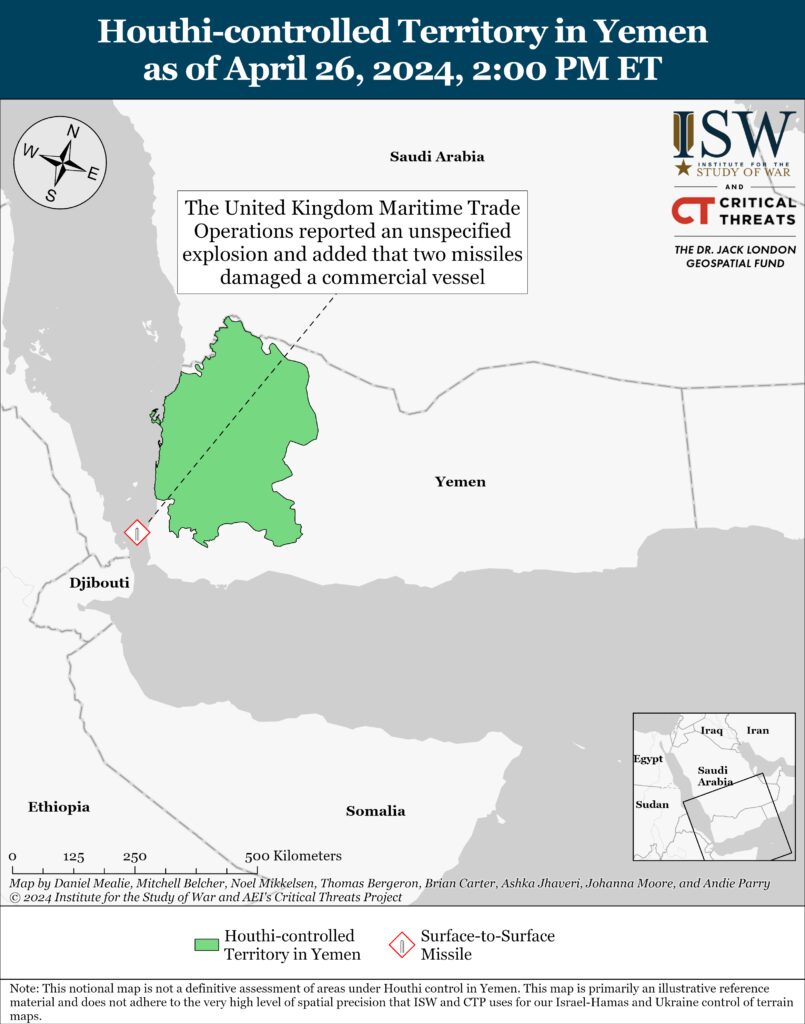
 Eurasia Press & News
Eurasia Press & News



